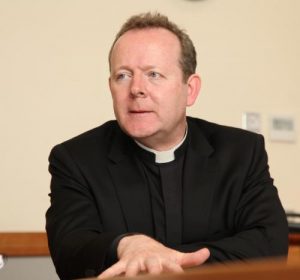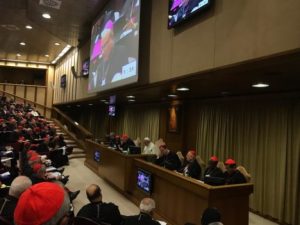
By Ann Marie Foley - 24 October, 2018

Archbishop Eamon Martin
“Young people are the agents of evangelisation to each other and, indeed, to the whole Church,” Archbishop Eamon Martin said in his address at the Synod of Bishops on the theme of ‘Young people, faith and vocational discernment’.
Speaking in the final days of the synod in a summary address to the Synod Fathers by the English language group, Archbishop Eamon Martin said that the “synodal journey” should not end, but should be brought home to episcopal conferences, dioceses and parishes.
“During the synodal process, inspired by the Holy Spirit, we have identified the need for ‘a preferential option’ for our young people,” he said.
The Catholic Church is facing a “re-imagination of parishes and structures so that young people are heard, listened to, appreciated and encouraged,” he said.
He added that the goal is to offer to young people what is described in Christifidelis Laici as a threefold experience of Church – as ‘mystery’, ‘communion’ and ‘mission’.
There was “a curious reversal of roles” at the synod, in that the young people accompanied the bishops in scrutinising ‘the signs of the times’ and not the opposite, he said. He added: “Many of us arrived at this Synod believing that it was about pastoral ministry ‘to’ young people – particularly given the many challenging situations they face throughout world.”
He listed the challenges as poverty, persecution, violence and human trafficking and migration, as well as young people’s vulnerability on social media, their compulsions and addictions, their loss of bearings and their longing for stable reference points and a sense of direction and purpose in life.
He added that the Spirit reminded the bishops at the synod that young people are not simply the ‘objects’ of evangelisation and pastoral ministry; they are ‘agents’ of evangelisation.
He explained that with formation and accompaniment, young people can be the missionary disciples who will bring the light of faith to their peers and even to those who are far away from Church, becoming ‘protagonists’.
“The call to holiness of these young ‘protagonists’ includes an invitation that they might transform temporal society – their world of media, politics, the digital highways, business, commerce and healthcare – transform, from within, with the values of the Gospel and the merciful love of God,” he said.
He said that that his (English language) group had a wide discussion about the Church’s vision of the body and human sexuality. They sought to present the Church’s vision, teaching and anthropology of the body, sexuality, love and life, marriage and chastity. They also restated the Church’s opposition to discrimination against any person or group.
He said that through this synod, God has opened bishops’ eyes to see that young people are God’s chosen instruments.
“They are co-responsible with all of us for changing the world. We must be careful not to block the rejuvenating work of the Holy Spirit! On the contrary, our role is to facilitate it,” he concluded.
He explained that this would involve ensuring that young people are “formed and accompanied in the love of Christ” by authentic guides and mentors, that they are schooled in prayer and sound catechesis, challenged to go out of their comfort zones to meet their peers in the peripheries, and strengthened by the witness of young saints and martyrs to endure setbacks, knocks and even persecutions for their faith.

The synod or assembly of bishops from around the world, gathered with the Holy Father, takes place every three years. This synod is the 15th Ordinary General Assembly of the Synod of Bishops.
Archbishop Eamon Martin, the President of the Bishops’ Conference and Bishop Donal McKeown of Derry, chair of the Council for Pastoral Renewal and Adult Faith Development, are representing the Irish bishops at the synod, which concludes on 28 October.
Archbishop Eamon Martin spoke as the deliberations on the working document had concluded and the first draft of the final text was expected on that day, 23 October 2018.